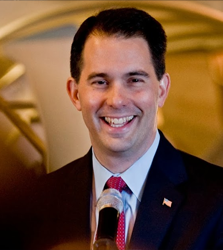
Praise for Walker, and Concerns Too
Wisconsin Gov. Scott Walker entered the crowded Republican field Monday to generally positive reviews. Mark Halperin at Bloomberg Politics gave him a B+ for his overall announcement performance, writing "His hard work honing his stump speech for months paid off big time with a performance confident and fluid throughout. Unabashedly patriotic, conservative, and ideological." Halperin also noted the announcement "Displayed every positive trait that has allowed him to vault to the top of the field."
Over at The Washington Post Amber Phillips offers her thoughts in an article titled "3 reasons Scott Walker could be the GOP’s savior, and 3 reasons he won’t" (despite the clumsy headline, Phillips does NOT conclude he won't win the nomination or be the GOP "savior"). Two of the three pluses are fairly predictable: Walker's fight with public sector unions in Washington plays well with the GOP base, and he's won three tough elections in a Democratic-leaning "blue" state. The third is relatively new and many won't be familiar with it:
3. He's also a conservative's conservative, says his budgetWalker announced his presidency only after wrapping up a lengthier-than-expected budget battle with the state legislature last week. Now that he's signed it into law, Walker can campaign on what Washington Post's Jenna Johnson accurately describes as "red-meat legislation," such as...
"...right-to-work legislation, expansion of school-voucher use, repeal of a 48-hour waiting period for those looking to purchase guns, mandatory drug testing for food-stamp recipients and a ban on all abortions after 20 weeks..."
All of these items are likely to be cornerstones of Walker's message as he begins his campaign. The same budget could pose problems for him, and appears as well in the list of three things that could hurt Walker:
1. Republicans question his spending prioritiesThe budget battle wasn't all good news for Walker, who is facing criticism from Republicans back home for wanting to spend $250 million of taxpayer money for a new professional basketball arena for the Milwaukee Bucks.
Conservatives also questioned his proposal to borrow $1.3 billion to pay for transportation projects. "At some point, your credit card is maxed out, and you can’t do any more,” state Assembly Speaker Robin Vos (R) said in a TV interview in early June, according to Johnson's reporting...
With corporate welfare becoming an issue with many Republican voters, taxpayer money for a professional sports team could be problematic. Other issues that could hamper Walker include his relatively weak home-state polling (his job approval rating in Wisconsin was only 41 percent in April) and his past support for immigration reform that included a pathway to citizenship for those currently in the country illegally.
Finally, and well worth the read, is a piece in National Journal suggesting that Walker's three election wins in blue Wisconsin may not be quite as impressive as they seem, at least in terms of translating that to a presidential election. Josh Kraushaar writes:
All three of his successful campaigns took place during nonpresidential years, when turnout among many of the Democratic Party's core constituencies dropped off precipitously. Wisconsin has one of the most polarized electorates in the country, and there's a significantly lower midterm turnout in the state's most-liberal counties (most dramatically, in Milwaukee County) compared to the state's conservative base (Waukesha County). The more a county supported Walker, the more likely it was to see strong turnout in an off-year election.
Walker's success had as much to do with the political calendar and the state's polarized electorate as it did with crossover appeal. He won only 6 percent of Democratic voters in his 2014 reelection. Many African-American voters simply stayed home during Walker's gubernatorial campaigns, while a disproportionate number of college students sat out the contentious June 2012 recall election—which took place after campuses' spring semester concluded. That's not likely to repeat itself if he's the GOP presidential nominee...
Republicans looking for a nominee with a viable path to the White House in 2016 will likely find much to like in the impressive record Walker has compiled in recent years, but just like every other candidate there are warning signs that some of the touted strengths may not be as robust as advertised.



